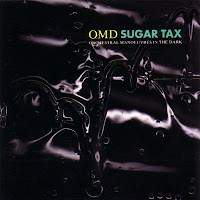Orchestral Manoeuvres In The Dark, or OMD as they are more easily abbreviated to, are one of those bands that I remember distinctly from my childhood. Two of their tracks, 'Joan Of Arc' and the companion 'Maid Of Orleans' were on a cassette my dad had that we used to listen to in the car on Saturdays. Between those two tracks, seeing Gary Numan on the Old Grey Whistle Test driving a Sinclair C5, and watching a Soft Cell video (Non-Stop Exotic Video Show) you have probably the three biggest influences on my early musical tastes; no surprise that it would coalesce into a love for electronic music that endures to this very day.

Those two tracks were taken from Architecture And Morality, OMD's 1981 album. I finally bought that album from RS McColl in Colchester while I was at University there in the mid Nineties along with some of the pre-Dare Human League albums. I love Architecture And Morality, especially the dystopian post-punk opener 'New Stone Age', but – sacrilegious though this must sound to 1981 purists – it doesn't do as much for me as their 1991 'comeback' album Sugar Tax. Again, my principal love for this album was from my dad playing the cassettes while we drove around Stratford-upon-Avon's boroughs and neighbouring villages on Saturday mornings. It's a glossy album that manages to deliver the stellar pop of 'Sailing On The Seven Seas', 'Pandora's Box' and 'Speed Of Light' but it also sees Andy McCluskey pay homage to his musical heroes Kraftwerk on the cover of 'Neon Lights' (Kraftwerk alleged quite happily that McCluskey nicked the melody for 'Electricity' from their 'Radio-Activity' but I don't hear it myself). Like the Pet Shop Boys with the orchestral stabs that dominated their early work, so too does the sampled choral harmonies that became an OMD staple dominate the sound of Sugar Tax.

I'm not too proud to admit that one of my favourite slushy films is Serendipity (2001), a 'rom com' about fate set in Manhattan starring Kate Beckinsale and John Cusack. In it, Beckinsale's fiance, the always annoying John Corbett (Lars) makes music effectively comprising his clarinet, drum 'n bass beats and sitars to create what jazzists would describe as 'fusion' but that I just call 'naff'; it goes without saying that his irritating character and the risible faux ethnology of the music is of course a convenient directorial vehicle for making the musician appear inferior to Cusack's own figure.

The reason for mentioning this is because this week I stuck on Loop Guru's Amrita...All These And The Japanese Soup Warriors and was struck by the similarity to the music made by Corbett's character in Serendipity, and it was a comparison that I couldn't get out of my head whilst listening to Amrita... and which ultimately prompted me to turn it off. I loved the album at the time, Loop Guru being part of one of the infinite substrata of 1990s 'dance' music genres, and I saw them live in Colchester at a very memorable concert at the Arts Centre in 1995; but something now seems so horribly dated and inauthentic about the sound. 'Yayli' – the track which least tries to orient itself into this ethnic-techno genre – still sounds good, but the rest may find themselves in the deleted items folder fairly soon. I hate it when you go back through your music collection and feel dissatisfied with albums you haven't heard for ages.
Vinyl corner

In the world of music, Pavement are regarded (along with, say, Sonic Youth or Dinosaur Jr.) as principal architects of an alternative sound which has influenced countless bands over the years. Even the musical magpie that is Damon Albarn cited the band as an influence for the patchy Blur album Blur (though I fail to hear anything but Blur therein). With a new compilation of their material just released, it's fair to assume that more people and bands will begin to be influenced by the band.
I own only one Pavement record, 1999's UK-only 'Carrot Rope' 7", which I've listened to more since recording it this week than I ever have since I bought it upon its release. It's a brilliant track, but – and I know this sounds superficial – I never want to put on the record because of the sleeve. Something about the peeling orange rope makes me feel nauseous, thus causing me to avoid it when I scour the box. Having overcome that reaction this week, I've been reminded of how much I love the jaunty, upbeat 'Carrot Rope', but also how much better the grandiose B-side ('And Then') is. I recall that at the time this came out I'd intended it to be the start of a proper immersion into the music of Pavement, which clearly never happened. Though I don't normally buy artist compilations, preferring instead to work my way through the albums sequentially, perhaps I should get that new 'best of'.



No comments:
Post a Comment